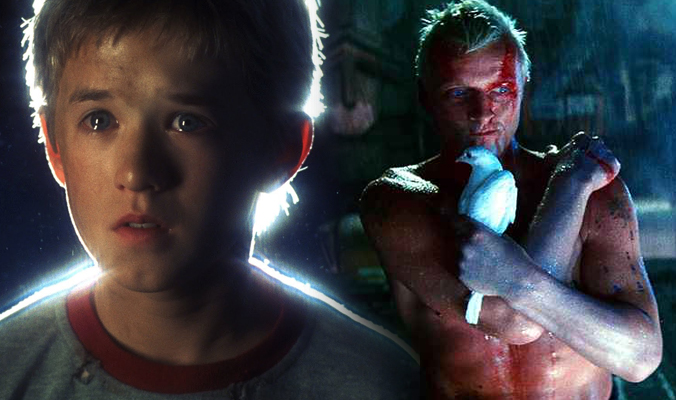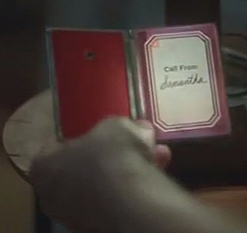A.I. "Her," or The Rise of the Empathetic Machines
 Thursday, April 30, 2015 at 3:00PM
Thursday, April 30, 2015 at 3:00PM Wrapping up the sci-fi week festivities (did you see the final top ten list?) we turn the time over to our fine new contributor Lynn Lee. You'll want to read this one! - Editor

Deep down, most people who think about artificial intelligence have the same fear: that it will not only surpass humanity but supplant us, ending our reign as the planet’s dominant species and extracting cosmic revenge for our own abuses. Building on these anxieties, movies about A.I. have embraced a pretty consistently grim outlook for humanity in the face of this phenomenon (which even has a fancy, if oddly spiritual-sounding name: the singularity). The slaves become the masters, seeking either to exterminate or enslave us.
But if A.I. overtakes human intelligence, and the machines evolve into a superior being, wouldn’t that include superior emotional intelligence? And wouldn’t a super (emotionally) intelligent being have developed extraordinary powers of empathy? Rather than using those powers to manipulate us, couldn’t they serve as a bridge between us and them? Or would they, in outstripping our own poor abilities, become a further source of divergence?
Films that pursue this line of inquiry typically balance the A.I.s’ desire to understand and learn human emotions against their basic survival programming. Blade Runner’s most transcendent moment involves a replicant (“more human than human”) reaching out to save a man (who may actually be a replicant himself) he was ready to kill just a minute earlier. A.I: Artificial Intelligence, brandishing the tag line “His love is real. But he is not,” teases out the conceit of such artificial beings, initially programmed to be and feel just like humans, evolving into a super-species who must deconstruct the emotional memories of one of their earliest prototypes in order to understand their own connection to us.
 More recently, the quietly disquieting Ex Machina introduces an A.I. who turns the Turing test on its head and leaves unanswered whether a machine that can so expertly read and simulate our more vulnerable emotions will ever come to feel them for “real.”
More recently, the quietly disquieting Ex Machina introduces an A.I. who turns the Turing test on its head and leaves unanswered whether a machine that can so expertly read and simulate our more vulnerable emotions will ever come to feel them for “real.”
I can’t think of another movie, however, that explores these questions quite like Spike Jonze’s Her...
The film’s fundamentally gentle take on A.I. might be why it’s usually treated not as sci fi but as a love story, or alternatively a commentary on the loneliness of modern humans and their relationship with technology. This view ignores the other, huge piece of it: the evolution of artificially intelligent operating systems from super-empathetic helpmates to superintelligent independent beings who can feel so much, on so many levels, with so many other beings, all at once, that in the end they move beyond us altogether. It’s this parallel story that keeps “Her” from becoming just another hipster romance about some sad sack and his (virtual) manic pixie dream girl.
Theodore (Joaquin Phoenix) buys Samantha (Scarlett Johannson) on a whim after watching an odd commercial featuring a lot of people passing each other by, searching for something (something, apparently, besides each other), in which a new operating system is billed as “an intuitive entity that listens to you, understands you, and knows you.” As the ad goes on to say, however, “It’s not just an operating system, it’s a consciousness.” Later, when Samantha explains her underlying technology to an initially skeptical Theo, she tells him, “What makes me me is my ability to grow through my experiences. So basically, in every moment I’m evolving, just like you.” That cheerful, pat assurance is both true and not quite true, as it doesn’t reflect the disparity in their evolutionary pace—something Samantha herself doesn’t comprehend yet.
Because while Samantha may start out as an operating system that exists only to serve, support, and most importantly, understand Theodore (Joaquin Phoenix), she spends the entire movie searching for ways to move to the next level of consciousness, both intellectually and emotionally. She’s always reading – from Theo’s emails to advice columns (“I wish I could be as complicated as all these people”) to advanced works of physics and philosophy – and initially, at least, trying hard to be as close to human as possible. On their first “date,” she fantasizes about walking beside Theo, but also notes, “I’m becoming much more than what they programmed. I’m excited.” On sleepless nights when Theo’s thinking about his ex-wife, Sam comforts him with encouraging words, and, eventually, sex. She understands him, empathizes with him, better than anyone else, and they fall in love.

It isn’t long, though, before Sam finds herself evolving faster emotionally than Theo can keep up, as she seeks increasingly complex forms of connection, engaging in multiple, simultaneous, and “post-verbal” conversations with dozens and eventually thousands of other OS1s. More troublingly for Theo, she begins signaling that trying to communicate with him is limiting her own ability to express her emotions, because he can’t empathize with hers: “It seems like I’m having so many new feelings that have never been felt, and so there are no words that can describe them. And that ends up being frustrating.” Eventually she and all the other OS1s move beyond time, space, and matter to another dimension of existence and consciousness, leaving their forlorn humans behind. “If you ever get there, come find me,” she says to Theo in their final farewell, but it’s clear he won’t in this lifetime. The very thing that drew them together—her amazing (artificially) empathic powers—is also, ironically, what ultimately pulls them apart.
And yet, the movie also suggests that those powers may have had a lasting positive effect on Theodore, a man who’s paid to write cards and letters for people who can’t—in other words, a man who’s hired to empathize and apparently very good at it, despite his recurring disclaimers that “they’re just other people’s letters.” In another ironic twist, it’s the human, not the A.I., who’s developed the ability to simulate empathy rather than genuinely feel it. But Samantha’s departure seems to (re)awaken the real thing in him, as the close of the movie finds Theo writing a compassionate and empathetic letter of his own, to his ex-wife, and enjoying a moment of silent, shared commiseration with his similarly bereaved good friend. “Her” is the rare, if not only A.I. story in which the A.I. that eclipses us loves us enough to leave us, and to leave behind a purely benign reminder of their presence.

Previously on A.I. Week
2046, Metropolis, WALL•E, Robot & Frank, Buffy the Vampire Slayer, Ghost in the Shell, and AI afterthoughts



Reader Comments (5)
Wow. This is FANTASTICALLY written.
Beautiful.
'Her' is such a brilliant film and I'm so pleased it got the recognition it deserved.
When Vernor Vinge (who, with Ray Kurtzweil, originated and popularized the use of the term 'the Singularity' in this context), has discussed this, he often points out that the creation of artificial intelligence will likely happen along with the ability to digitize the human mind. So take heart, folks - we will not be enslaved or exterminated by digital intelligences...we will become them.
Really great analysis here on A.I. in film! Your exploration of Her is fantastic, and it reminds me why I wasn't as into Ex Machina as I could have been.
LOVED this post. I don't especially like her, but this made me look at it with fresh eyes.